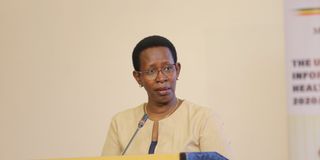Prime
Atwine weeps over teen pregnancies

Dr Diana Atwine, Permanent secretary of Ministry of Health.
What you need to know:
Dr Atwine says good policies won’t curb cases unless stakeholders reach out and help young people.
The Permanent Secretary in the Ministry of Health, Dr Diana Atwine yesterday broke down in tears as she begged stakeholders to get out of their comfort zones and go on the ground to tackle teenage pregnancies and sexually transmitted infections.
Speaking at the national launch of the Global Alliance to End Aids in Children by 2030, Dr Atwine said stakeholders must go on the ground and engage the young people to make a difference in their lives.
She said: “Designing guidelines and strategies is not enough. We must get out of our comfort zones and get where these young people are, talk to them, listen to them, and address their problems. We have no business if we can’t solve their issues. I recently talked to some of the teenage mothers at a health facility near a fishing community in Packwach, I walked out and cried. Girls as young as 12 years were pregnant. These children need us to talk to them and address their issues.”
“I’m so emotional because I have three adolescent girls. When I looked at these children I said, I’m their mother. How can we just continue like this as if what is happening is normal?” Dr Atwine said, with a shaky voice.
She noted that she had scheduled an urgent meeting on Monday with representatives from the ministries of Gender and Education to discuss issues that learners are grappling with.
Concerns
“We need to, because if we don’t invest in them now, then we cannot invest in the future of our country. We need to address issues that force children to drop out like poverty and cultural issues. We also need to address HIV/Aids among adolescents, teenage pregnancy, making sure that we create an environment where they can be safe, they can be listened to, understood, and supported,’’ Dr Atwine said.
According to statistics from the United Nations Population Fund (UNPA), 32,000 teenagers got pregnant every month in Uganda between 2020 and 2021, during the Covid-19 pandemic when schools were closed.
The permanent secretary also emphasised the importance of strengthening prevention of mother-to-child transmission of HIV, encouraging mothers to attend antenatal care and giving birth at health facilities as some of the interventions that will curb HIV infections among children.
According to statistics from the Uganda Aids Commission (UAC) fact sheet for 2023, of the total of 52,000 new HIV infections in 2022, 19,000 were among young people aged 15 to 24, with young women disproportionately affected, contributing 15,000 of the cases. Similarly, of the 8,600 new HIV infections in adolescents, 8,000 were girls.
In the UAC factsheet, up to 5,900 children got HIV infection through mother-to-child transmission (MTCT) in 2022, a reduction from 20,000 in 2010.
Speaking at the same event, Dr Cordelia Katureebe, the national coordinator of HIV Care and Treatment at the Health ministry, said the initiative to end Aids in Children by 203 would ride on strategies that have curbed the number of infections.
Dr Katureebe said retention in care for pregnant and breastfeeding women for reducing MTCT is at 72 percent.
She also revealed that anti-retroviral coverage for children aged 0 to 14 is at 72 percent, meaning many are not accessing care and don’t even know their HIV status.
“Global Alliance to End Aids in Children by 2030 is a nine-year initiative that is going to be done in three-year phases....This is a continuation of what we have been doing,” she said.
A section of stakeholders recently stressed the need of empowering children to report cases of sexual violence, which is one of the driving factors for the escalating cases of teenage pregnancies.
Mr John Tereraho, the head of education at Save the Children, said education is not about teaching children how to calculate numbers and speak very good English, but it is about helping children to grow and manage situations.
Ms Angella Kasule Nabwowe, the executive director of Uganda Initiative for Social and Economic Rights, told Daily Monitor yesterday that the government should consider implementing a sexuality framework to empower children.
“The government should roll out the implementation of the National Sexuality Framework to empower the learners with information and knowledge to guard against and promptly report advances, incidents and cases of that nature,” she said.
In 2018, the Ministry of Education and Sports launched the sexuality framework for schools. But it was shelved after Parliament and other sections of the public rejected it.




